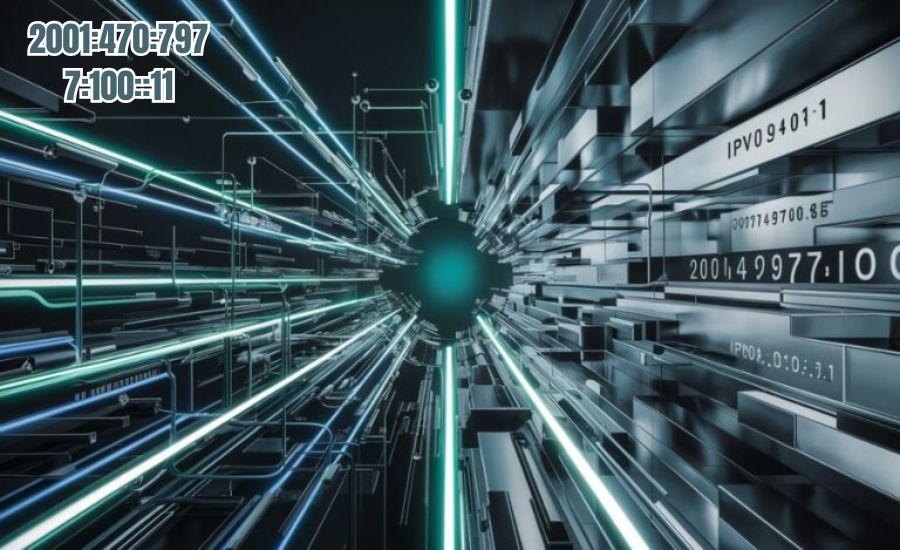Understanding IPv6 Address: 2001:470:7977:100::11 – A Complete Guide

The internet connects billions of devices across the world, and each of those devices needs a unique identifier to communicate with others. This identifier is known as an IP address. Today, most internet users are familiar with IPv4 addresses, which are written in the form of four numbers separated by dots (e.g., 192.168.0.1). However, with the growth of the internet and the increasing number of devices, IPv6 addresses have become necessary. These addresses are longer, more complex, and more capable of handling the expanding internet.
In this article, we’ll take a closer look at 2001:470:7977:100::11, a specific IPv6 address, and explain its significance, structure, usage, and much more. This guide is intended for beginners and anyone interested in understanding IPv6 and how it works.
What Is an IP Address?
An IP address (Internet Protocol address) is a unique identifier assigned to each device connected to a network. It’s like an address for your home—without it, the internet wouldn’t know where to send the data you request.
The Role of an IP Address
- Identifying Devices: Just like a street address identifies your home, an IP address identifies your device on the internet.
- Routing Information: When you send data (like visiting a website or sending an email), the IP address helps route that data to the correct location.
- Communication: Devices use IP addresses to communicate with one another, ensuring the right information reaches its destination.
There are two types of IP addresses in common use today: IPv4 and IPv6. Let’s explore them in more detail.
IPv4 vs. IPv6: The Need for IPv6

IPv4 is the older version of the Internet Protocol and was introduced in the early days of the internet. It uses a 32-bit address format, which limits the number of unique addresses to around 4.3 billion. While this seemed like plenty at the time, the explosive growth of the internet—especially with the rise of mobile devices, the Internet of Things (IoT), and smart homes—has caused a shortage of IPv4 addresses.
What Is IPv6?
IPv6 is the next-generation IP address system. Unlike IPv4, which uses 32-bit addresses, IPv6 uses a 128-bit format. This allows for an almost limitless number of unique addresses, ensuring the continued growth of the internet.
- IPv4 provides 4.3 billion unique addresses.
- IPv6 can provide approximately 340 undecillion (340 followed by 36 zeros) addresses.
IPv6 is essential for the future of the internet, as it accommodates the increasing number of devices and ensures that everyone can connect without running out of available IP addresses.
Breaking Down the IPv6 Address 2001:470:7977:100::11
Now, let’s take a closer look at the specific IPv6 address 2001:470:7977:100::11. At first glance, it may appear complicated, but we’ll break it down into simpler parts to help you understand how it works.
Structure of an IPv6 Address
An IPv6 address consists of eight groups of four hexadecimal digits (numbers and letters from A to F). These groups are separated by colons, and each group represents 16 bits of information.
The full address looks like this:
makefile
Copy code
2001:470:7977:100:0000:0000:0000:0011
However, IPv6 addresses allow for compression to make them easier to read and manage. The series of zeros in the middle can be shortened to ::, which represents a group of consecutive zero values. So, the compressed version of this address becomes:
makefile
Copy code
2001:470:7977:100::11
Let’s break this down further:
- 2001: This is the network prefix that identifies the address block. It tells you which section of the internet this address belongs to.
- 470:7977:100: These are the subnet identifiers that further specify the location or network segment. These sections direct data to a more specific area within the larger address space.
- ::11: This is the interface identifier, which is usually assigned to a particular device on the network. The :: represents consecutive zeros, and 11 is the unique identifier for the device.
Why Is This Address Important?

The IPv6 address 2001:470:7977:100::11 is unique and provides a way for a device to connect to the internet or any network. Every device on the internet needs a unique IP address to ensure that the data reaches the correct destination. This specific address is assigned to a device, allowing it to send and receive data.
How IPv6 Addresses Are Assigned
IPv6 addresses are typically assigned by an Internet Service Provider (ISP) or a network administrator. In the case of 2001:470:7977:100::11, the address could belong to a specific organization, data center, or device.
Why Use IPv6?
IPv6 addresses, like 2001:470:7977:100::11, provide several advantages over IPv4:
- More Addresses: IPv6 provides an enormous pool of addresses, ensuring that devices don’t run out of unique identifiers.
- Improved Security: IPv6 includes built-in security features, such as IPsec, which helps protect data as it moves through the internet.
- Faster Routing: IPv6 simplifies network routing, making data travel more efficiently across the internet.
- Better for IoT: As more and more devices connect to the internet (such as smart thermostats, appliances, and vehicles), IPv6 provides a better way to handle all these new devices.
I Hope You Appreciate This: 1-862-336-5803
How Does IPv6 Improve Internet Functionality?
While IPv4 served us well for many years, the increasing demand for more devices and faster connections has highlighted its limitations. IPv6 is the solution to this problem, offering a more scalable, efficient, and secure way to connect devices on the internet.
Scalability and Flexibility
One of the main reasons IPv6 is so important is its ability to scale. With IPv6, the number of available addresses is virtually limitless. This means that every device can have a unique IP address, and we don’t have to worry about running out of addresses like we did with IPv4.
For example, in a world where nearly every object can be connected to the internet—such as cars, wearables, home appliances, and more—IPv6 ensures that there are enough addresses to go around.
Enhanced Security Features
Security is a major concern on the internet, especially when it comes to protecting personal data and sensitive information. IPv6 improves security in several ways:
- IPsec Support: IPv6 has built-in support for IPsec, a suite of protocols designed to secure internet communications. This helps protect data as it travels over the network.
- Better Privacy: IPv6 addresses use a more complex addressing scheme that makes it harder to track users based on their IP address.
Efficient Routing
IPv6’s addressing scheme simplifies routing, which helps make the internet faster and more efficient. Because IPv6 allows for more efficient routing tables, data can travel faster between devices, reducing latency and improving overall internet performance.
Why Should You Care About IPv6?

As a user, you may not always think about the IP address behind your device’s connection to the internet. However, understanding IPv6 and its benefits can help you appreciate the advancements in internet technology and how it affects you.
Compatibility and Future-Proofing
One of the biggest reasons to care about IPv6 is that it’s the future of the internet. Many websites and services are already adopting IPv6 to future-proof their infrastructure and ensure that they can continue to accommodate new users and devices. If you want to ensure you’re using the most up-to-date technology, understanding IPv6 is essential.
Better Device Connectivity
The rise of the Internet of Things (IoT) means that more devices are connecting to the internet than ever before. With IPv6, each device—whether it’s a smart fridge, security camera, or wearable tech—can have its own unique IP address. This makes it easier for these devices to communicate with each other and with the internet.
Common IPv6 Usage Scenarios
IPv6 is used in many different environments, from home networks to large-scale enterprise systems. Here are a few common scenarios where IPv6 is important:
- Home Networks: If you have multiple devices at home, such as smartphones, laptops, and smart TVs, IPv6 ensures that each device can have its own unique address without conflict.
- Data Centers: Large organizations and data centers use IPv6 to manage the vast number of devices and servers they operate.
- Internet of Things: As more everyday objects become “smart,” IPv6 ensures that all these devices can connect to each other and to the internet.
Conclusion
The transition from IPv4 to IPv6 is an essential part of the internet’s evolution. IPv6 addresses like 2001:470:7977:100::11 will play a crucial role in ensuring the continued growth of the internet and the seamless connection of devices worldwide. Whether you’re using the internet for work, school, or entertainment, IPv6 will make it more secure, efficient, and future-proof.
As more and more organizations adopt IPv6, it’s important for internet users to understand its role in shaping the future of the internet. By embracing IPv6, we ensure that the internet remains open, accessible, and capable of supporting the growing number of connected devices.
FAQs
Q: Do I need to know my IPv6 address?
A: You typically don’t need to worry about your IPv6 address unless you’re setting up a network or configuring devices. Your ISP will take care of assigning it to your devices.
Q: Is IPv6 safer than IPv4?
A: Yes, IPv6 includes built-in security features like IPsec that protect your data during transmission, making it more secure than IPv4.
Q: Can I still use IPv4?
A: Yes, IPv4 is still in use today, but IPv6 is becoming more common. Many networks use both IPv4 and IPv6, a setup known as “dual-stack.”
Q: Why are IPv6 addresses so long?
A: IPv6 addresses are longer because they need to accommodate billions of devices. The long format allows IPv6 to provide enough unique addresses to meet future demands.
Stay in touch to get more updates on USA MAGZENE







